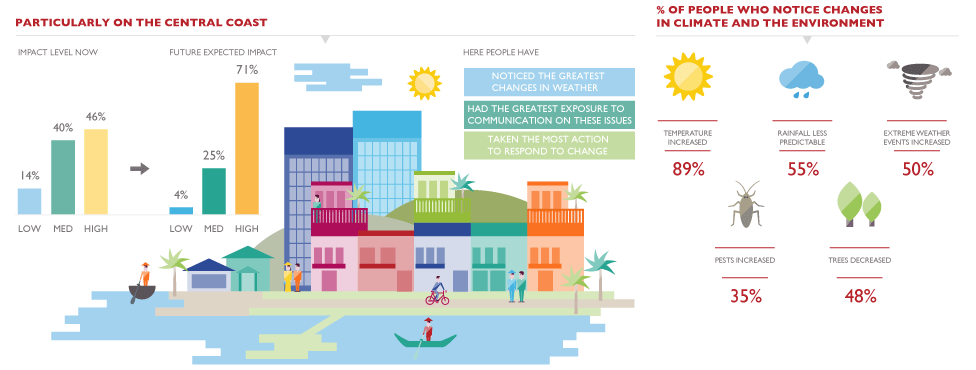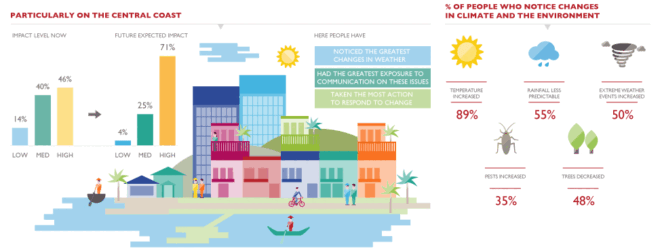Perceptions of Climate Change in Vietnam

The Climate Asia project
Climate Asia is the largest ever study of people’s experience of climate change in seven countries – Bangladesh, China, India, Indonesia, Nepal, Pakistan and Vietnam – involving the collection and analysis of survey data from over 33,500 people. This unique data provides information for governments, donors, the media, NGOs and everyone who wants to support people to adapt to the changing environment.
Country Infographic

Context
In recent years, Vietnam has developed at a fast pace and life has improved for most people. But across the country people are noticing changes in their environment. They think temperatures are rising and becoming more extreme and that patterns of rainfall are changing and becoming less predictable.
For some, these changes are having an impact on their lives now. In rural areas farmers describe new difficulties in planting and harvesting crops. People in cities describe less direct changes in their lives, particularly new concerns about health and increases in power cuts.
Many people reported they are already taking action in their daily lives to respond to the changes they notice and anticipate. They were listening to weather reports, diversifying their crops or using energy more efficiently. But others struggle to act; these people are more likely to be poor or isolated and have needs that require urgent attention.
People in central coastal areas have noticed larger changes in climate and are taking more action to deal with them than those in other parts of the country. They feel better informed about how to respond to change having been exposed to more communication on these issues than people in other areas. Despite this, they still want to know more about how to reduce the impact they feel.
Communication
The Vietnamese government, civil society and media have been relatively successful in communicating on issues of climate and development. As a result, people’s awareness of climate change is high. Communication is already helping people take action to respond to the impacts they feel.
However, there are opportunities to reach more people with information about responses to changes in climate that are tailored to their circumstances and needs. For instance, people are keen to fit in so communication can motivate them by showing that others are already taking action.
Farmers are interested in information and programmes that help them to increase their income and crop yields or to save money. They want them to be based on real and proven success stories and would like to see examples of good practice from other farmers or experts. Their preferred medium is television.
People tend to trust information from organisations or people that are close to them. In rural areas, community meetings still play a large part in communication. The government is also a trusted source of information and high-ranking officials are considered to be important role models.
Findings
98% had watched TV in the last day.
95% are motivated to respond to provide their children with a better future.
92%are interested in information on future impacts.
41%name not knowing other people in their neighbourhood who are taking action as a barrier.
95% feel fitting in with other people is important to them.
58% have heard and understand the term climate change.
89% of people thought temperature had increased.
(0) Comments
There is no content